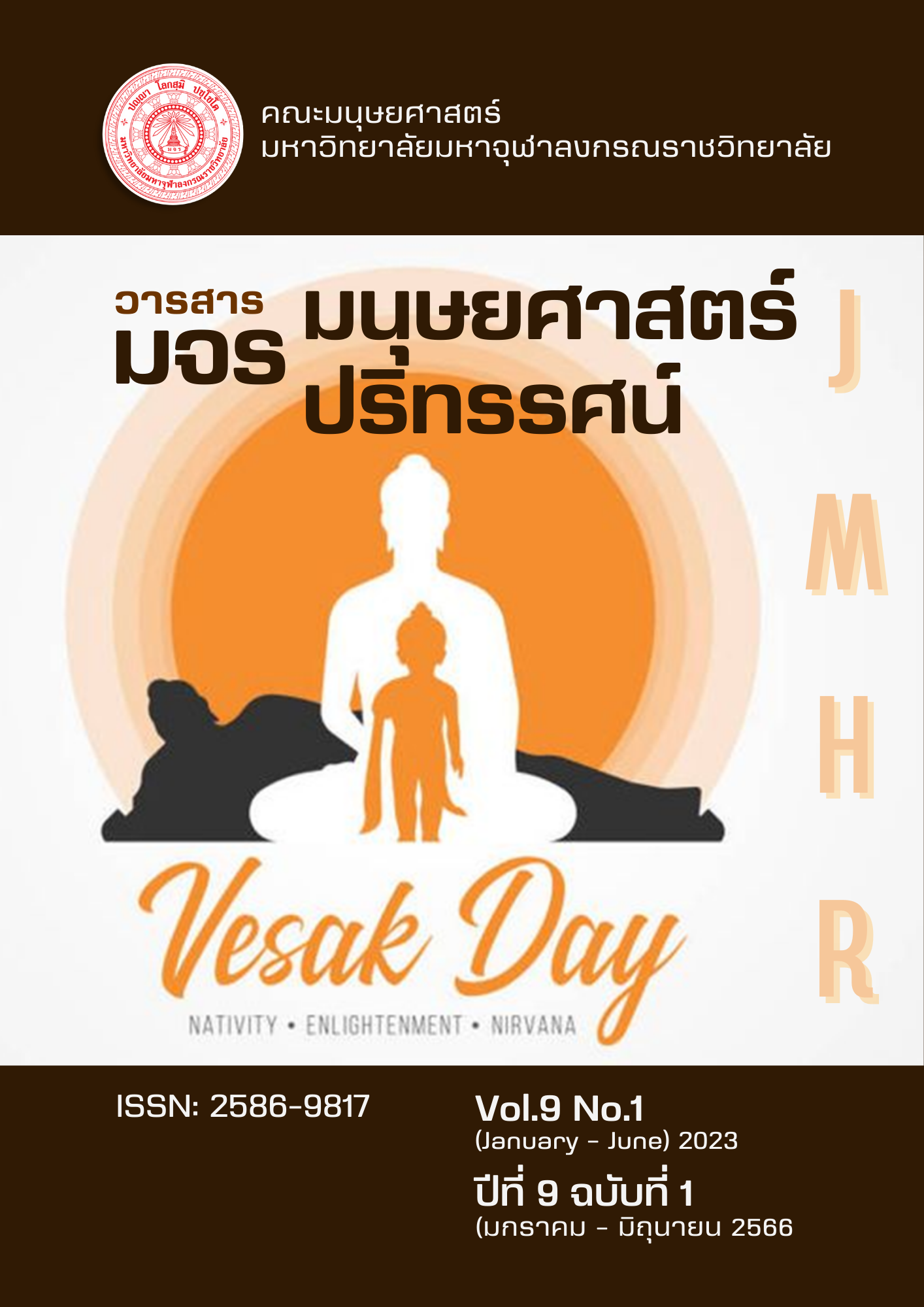สมรรถนะผู้นำเชิงพุทธจิตวิทยาเพื่อส่งเสริมความสุข ในการทำงานของวิศวกรไทย
คำสำคัญ:
สมรรถนะ, ผู้นำ, พุทธจิตวิทยา, องค์กรแห่งความสุข, วิศวกรไทยบทคัดย่อ
งานวิจัยนี้มีวัตถุประสงค์เพื่อ 1. ศึกษาสมรรถนะผู้นำเชิงพุทธจิตวิทยาเพื่อส่งเสริมความสุขในการทำงานของวิศวกรไทย 2. ศึกษาปัจจัยสมรรถนะผู้นำเชิงพุทธจิตวิทยาที่มีอิทธิพลต่อการส่งเสริมความสุขในการทำงานของวิศวกรไทย และ 3. ประเมินองค์ความรู้รูปแบบสมรรถนะผู้นำเชิงพุทธจิตวิทยาเพื่อส่งเสริมความสุขในการทำงานของวิศวกรไทย การวิจัยใช้ระเบียบวิธีวิจัยรูปแบบผสานวิธี โดยใช้แบบสัมภาษณ์มีโครงสร้างเก็บข้อมูลเชิงคุณภาพจากผู้ให้ข้อมูลสำคัญที่เชี่ยวชาญด้านพุทธจิตวิทยาและด้านผู้นำวิศวกรไทย จำนวน 17 ท่าน และใช้ แบบสอบถามสมรรถนะผู้นำวิศวกรเชิงพุทธจิตวิทยาส่งเสริมความสุขในการทำงานของวิศวกรไทย จำแนกเป็นสมรรถนะผู้นำวิศวกรรม สมรรถนะผู้นำตามหลักพุทธธรรม สมรรถนะผู้นำตามหลักจิตวิทยา ซึ่งมีค่าความเชื่อมั่นที่ ระดับ 0.960 เก็บข้อมูลจากกลุ่มตัวอย่างวิศวกรโยธา 126 คน วิเคราะห์ข้อมูลเชิงคุณภาพด้วยวิธี 6’C Technic และ Triangulation Technique วิเคราะห์ข้อมูลเชิงปริมาณด้วยวิธี การวิเคราะห์การถดถอยเชิงพหุคูณเชิงเส้น (Multiple Linear Regression Analysis)
ผลการวิจัย พบว่า
- การศึกษาสมรรถนะผู้นำเชิงพุทธจิตวิทยาเพื่อส่งเสริมความสุขในการทำงานของวิศวกรไทยพบว่า การสร้างเสริมความสุขการในการทำงานวิศวกรโยธานั้น เป็นการนำหลักพุทธธรรม คือ พรหมวิหาร 4 และปาปณิกธรรม 3 บูรณาร่วมกับหลักจิตวิทยาเชิงบวก และจิตวิทยาแรงจูงใจของมาสโลว์ เป็นแนวทางในการพัฒนาเครื่องมือเพื่อสร้างเสริมความสุขให้เกิดกับวิศวกรไทย และพัฒนาคุณลักษณะที่ดีของผู้นำวิศวกรให้เป็นผู้นำวิศวกรผู้มีสมรรถนะเชิงพุทธจิตวิทยา คือ มีจิตใจเมตตากรุณา คิดบวก มีวิสัยทัศน์ที่ดี รู้เป้าหมายที่ชัดเจน สามารถสร้างแรงจูงใจ สร้างแรงบันดาลใจ สร้างแรงศรัทธา นำตน นำคน นำงาน ไปสู่เป้าหมายความสำเร็จได้ สงผลให้เกิดความสุขในการทำงานตามหลักพุทธธรรมครอบคลุมความสุขเชิงองค์รวม 4 ประการ ได้แก่ ความสุขทางกาย ความสุขทางสังคม ความสุขทางจิตใจ และความสุขทางปัญญา
- การปัจจัยสมรรถนะผู้นำเชิงพุทธจิตวิทยาที่มีอิทธิพลต่อการส่งเสริมความสุขในการทำงานของวิศวกรไทย พบว่า มีสมรรถนะผู้นำเชิงพุทธจิตวิทยาของผู้นำวิศวกร ประกอบด้วย 3 สมรรถนะ เมื่อเรียงจากค่าเฉลี่ยจากมากไปน้อย ในภาพรวมนั้น พบว่า สมรรถนะที่มีค่าเฉลี่ยมากที่สุด คือ 1) สมรรถนะผู้นำตามหลักพุทธธรรม 2) สมรรถนะผู้นำตามหลักจิตวิทยา 3) สมรรถนะผู้นำวิศวกรรม
- การประเมินองค์ความรู้รูปแบบสมรรถนะผู้นำเชิงพุทธจิตวิทยาเพื่อส่งเสริมความสุขในการทำงานของวิศวกรไทย พบว่า โดยผู้ทรงคุณวุฒิ ด้วยหลักการประเมินระบบแบบอิงมาตรฐาน (Evaluation Standard) 4 ด้าน ได้แก่ ด้านความถูกต้องและครอบคลุม ด้านความเหมาะสม ด้านความเป็นไปได้ในการนำไปใช้ ความมีประโยชน์ ผลการประเมินมีความถูกต้อง เหมาะสม เป็นไปได้ในการนำไปใช้ และมีประโยชน์ในระดับมากที่สุดทุกด้าน สรุปได้ว่า รูปแบบนี้มีประสิทธิภาพสามารถนำไปใช้ได้จริง
เอกสารอ้างอิง
ฉัตรตรา กุศล และ สุรภา ไถ้บ้านกวย. (2561). การศึกษาค้นคว้าอิสระเรื่องการจัดการงานก่อสร้างสา หรับธุรกิจก่อสร้างที่พักอาศัยในเขตกรุงเทพมหานครและปริมณฑล (วิทยานิพนธ์บริหารธุรกิจมหาบัณฑิต). มหาวิทยาลัยรามคำแหง. กรุงเทพฯ.
ทรงยศ อรัญยกานนท์. (2557). ภาวะผู้นำกับการสร้างทัศนคติเชิงบวกต่อนวัตกรรมการบริการขององค์กรปกครองส่วนท้องถิ่น (วิทยานิพนธ์ปริญญาปรัชญาดุษฎีบัณฑิต). มหาวิทยาลัยศิลปากร. กรุงเทพฯ.
ธวัชชัย ตรีวรชัย. (2561). ภาวะผู้นำของผู้บริหารตามหลักพรหมวิหาร 4 ในเทศบาลเมืองลำตาเสา อำเภอวังน้อย จังหวัดพระนครศรีอยุธยา. วารสารปรัชญาปริทรรศน์. 23(1), 71-81.
มนต์ชัย วงศ์สันติราษฎร. (2556). ปัจจัยที่มีผลกระทบต่อประสิทธิภาพการควบคุมงานก่อสร้าง กรณีศึกษาองค์การบริหารส่วนตำบลภายในจังหวัดนครราชสีมา (หลักสูตรปริญญาวิศวกรรมศาสตรมหาบัณฑิต). มหาวิทยาลัยเทคโนโลยีสุรนารี. นครราชสีมา.
พระมหาอาคม อตฺถเมธี และ พระมหาจักร พลสิริธโร. (2565). การศึกษาภาวะผู้นำตามหลักทุติยปาปณิกสูตรของผู้บริหารโรงเรียนพระปริยัติธรรม จังหวัดเลย. วารสารวิจัยศรีล้านช้าง, 2(5), 1-11.
วิภาพร บุญนาค. (2556). ระดับความพึงพอใจในการทำงานกรณีศึกษาพนักงานธนาคารธนชาต จำกัด (มหาชน) ที่ปฏิบัติงานประจำสาขา สังกัดสำนักงานเครือข่ายกรุงเทพฯ (สารนิพนธ์บริหารธุรกิจมหาบัณฑิต). มหาวิทยาลัยหอการค้าไทย. กรุงเทพฯ.
McClelland. D.C. (1961). The achieving society. New York: The Free Press.
ดาวน์โหลด
เผยแพร่แล้ว
รูปแบบการอ้างอิง
ฉบับ
ประเภทบทความ
หมวดหมู่
สัญญาอนุญาต
ลิขสิทธิ์ (c) 2023 วารสาร มจร มนุษยศาสตร์ปริทรรศน์

อนุญาตภายใต้เงื่อนไข Creative Commons Attribution-NonCommercial-NoDerivatives 4.0 International License.






